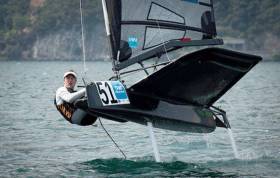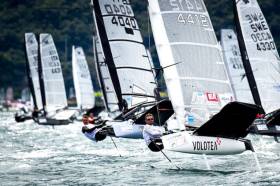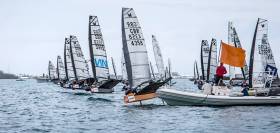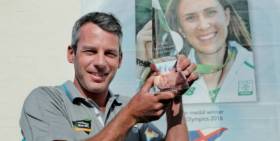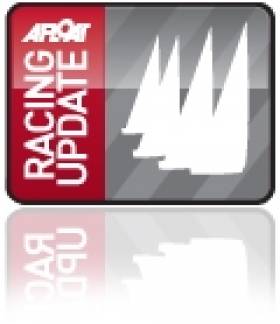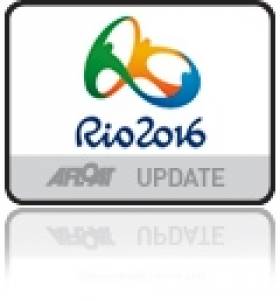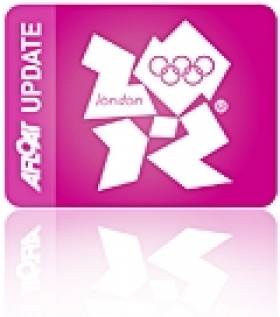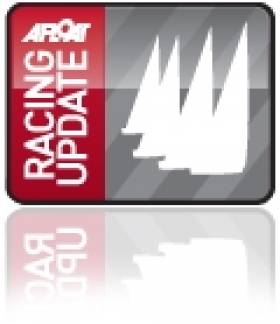Displaying items by tag: Rory Fitzpatrick
An international fleet featuring two Irish foilers plus the reigning two-time world champion Paul Goodison of the U.K. is set to contend the Bacardi Moth World Championship next week on Bermuda's Great Sound.
Royal Cork's David Kenefick and Rory Fitzpatrick from the National Yacht Club and Royal Irish Yacht Club will contest the event hosted by the Royal Bermuda Yacht Club and co-organised with the International Moth Class Association.
Laset year, Kenefick was the top Irish performer at a bumper edition of the foiling event in Italy when the Cork Harbour man finished 31st.
The 77th running of the Moth Worlds is scheduled Mar. 26-Apr. 1. Prior to that the Bermuda Moth National Championship will be staged Mar. 23-24.
Goodison, a member of the Artemis Racing Team for the America's Cup last summer in Bermuda, won the Worlds last year in Italy and two years ago in Japan. He won the 2017 Worlds by a comfortable 20 points and the 2016 Worlds by a scant 3 points. Through the two victories Goodison has racked up seven race wins and 20 top-3 finishes in 24 starts.
He comes into the regatta as the decided favorite and hopes to lay waste to this year's fleet with a new implement of destruction. Goodison took delivery of a new Kevin Ellway-designed Exocet Moth built by Maguire Boats of the U.K. at the end of January. He describes the boat as the same one with which he won the past two Worlds but with a potentially devastating development.
"It has a steeper wing bar in an effort to gain righting moment," said Goodison. "It's harder to sail because the angle of the bar is so steep that I'm not sliding across side-to-side like on the old boat. It's more of an uphill/downhill action, but the benefit is more straight-line speed."
The international fleet of 45 entries includes Australians Iain Jensen and Tom Slingsby, who placed 3rd and 4th, respectively, at the 2017 Worlds, and Matt Struble of the U.S., who won the U.S. Nationals two weeks ago. The fleet counts 12 entries from Great Britain, eight from the United States and four each from Australia and Bermuda. Entries have also been received from Canada, France, Germany, Hong Kong, Ireland, Italy, Netherlands, Portugal and Switzerland. Eight sailors are racing for the Master's title and there is one entry each for the Women's and Youth divisions.
List Of Entrants (Subject to change)
Alex Adams (GBR), Kai Adolph (GER, Master's), Vanessa Ampelas (FRA, Women's), Francisco Andrade (POR), Aymeric Arthaud (FRA), Michael Barnes (GBR), Andrew Brazier (CAN), Francesco Bruni (ITA), Philipp Buhl (GER), Scott Bursor (USA), Matthew Chew (IRL), Victor Diaz de Leon (USA), Harmen Donker (NED), James Doughty (BER), Rory Fitzpatrick (IRL), Giovanni Galeotti (ITA), Zane Gills (AUS, Master's), Paul Goodison (GBR), Joshua Greenslade (BER), Ted Hackney (AUS), Simon Hiscocks (GBR, Master's), David Holenweg (SUI), Chris Jeeves (GBR), Iain Jensen (AUS), Andreas John (GER, Master's), David Kenefick (IRL), Rome Kirby (USA), Christian Luthi (BER, Master's), Benoit Marie (FRA), Zack Maxam (USA), Jim McMillan (GBR), Rob Partridge (HKG), Ben Paton (GBR), Brooks Read (USA), James Ross (GBR, Master's), Dennis Sargenti (USA), Philippe Schiller (SUI), Andrew Scrivan (USA), Tom Slingsby (AUS), Benn Smith (BER, Youth) Dave Smithwhite (GBR, Master's), Matthew Stark (GBR), Kyle Stoneham (GBR), Matt Struble (USA, Master's), Dan Ward (GBR)
Annalise & Rory Are Fluttering Best of Irish in Moth Worlds
The fleet in the International Moth Worlds 2017 at Lake Garda have finally boiled down to “only” 220 boats after some early estimates reckoned they should be expecting between 240 and 250 writes W M Nixon.
But as it is, the 220 boats and the volatile weather of mid-Europe in high summer have seen one day lost with no wind at all since the championship proper got going on Tuesday morning, while other races have seen conditions fluctuating wildly with the occasional thunderstorm to add to the fun.
Out of it all has come the news that once the national representation gets over a certain size, it’s described as “a flutter of Moths”. And apparently the word is that the Irish squad have qualified as “a flutter”.
Come to that, you could take a useful flutter on Annalise Murphy becoming the new Women’s World Champion, as she’s currently showing well clear ahead. That said, anyone who claims to understand how all the different fleets are being given meaningful overall placings clearly hasn’t been studying the results at all….
As for the rest of the Irish flutter, Annalise’s Olympic coach Rory Fitzpatrick has also been showing well, with a first and second in there on his scorecard. But in a fleet of this size and complexity, all sorts of final results are possible when this totally international event eventually concludes.
Rory's Irish Moth in Top Ten At Bermuda's International Moth Regatta
Moth Sailor Rory Fitzpatrick from Dun Laoghaire enjoyed a great end fo a great season in his foiling dinghy when he placed tenth overall at the MS Amlin International Moth Regatta in Bermuda last week. The National Yacht Club sailor chalked up the top score against some of the best of the international foiling fleet. The regatta attracted a field of 50 Mothists from 10 nations. Fitzpatrick adds the result to his fifth overall achieved at the Euro champs in France in July.
England's Rob Greenhalgh is a hard man to bet against when there's money on the line. Just ask Chris Rashley or Dylan Fletcher-Scott.
For the second consecutive year, Greenhalgh came through when it mattered most and successfully defended the MS Amlin International Moth Regatta hosted by the Royal Bermuda Yacht Club.
Last year Greenhalgh entered the final day trailing Rashley by 1 point. He then went out and won four races to score an 8-point victory.
MS Amlin International Moth Regatta Final Provisional Standings
(After 12 races, including two discards)
1. Rob Greenhalgh, GBR, 22 points
2. Dylan Fletcher-Scott, GBR, 25
3. David Hivey, GBR, 34
4. Ben Paton, GBR, 61.5
5. James McMillan, GBR, 64
6. Dan Ward, GBR, 75
7. Jonathan Heathcote, GBR, 75
8. Simon Hiscocks, GBR, 76
9. Stefano Rizzi, ITA, 79
10. Rory Fitzpatrick, IRL, 92
Olympic Watersport Coaches Share Philips Award For August
The Philips Sports Manager of the Month for August is being shared by the two succesful Olympic medal winning coaches – both in waterports – from Rio.
Irish Sailing Association Olympic coach Rory Fitzpatrick and Morten Espersen, the High Performance Director and Olympic Manager with Rowing Ireland are joint winners of the prestigious award for the month of August.
The award is an acknowledgement of the success of sailor Annalise Murphy and rowers Gary and Paul O’Donovan at the Olympic Games in Rio.
Annalise and the O'Donovan brothers brought home silver medals in the Laser Radial Sailing and Lightweight Double Sculls rowing categories respectively.
The sailing medal was the first since Moscow in 1980 and the O’Donovan brothers secured the first ever medal for Ireland in rowing.
National Yacht Club's Fitzpatrick Sixth At UK Moth Champs
#moth – 2004 Olympic sailor Rory Fitzpatrick from the National Yacht Club in Dun Laoghaire has finished sixth at the 58–boat UK Moth National Championships.
The final day didn't provide the glamorous conditions of the previous two days, but the Stokes Bay Race Team, led by Principal Race Officer Mike Rayden, managed to complete the full series in marginal foiling conditions.
With Chris Rashley clearly out in front, the battle for second place overall was hot - just six points separated 5 boats going into the final day.
In the end Ben Paton just pipped Jason Belben thanks to a third place in the final race. The pair ended equal on points but Paton's greater number of second place results gave him the runners-up spot on the podium.
The fleet has gone through a lot since the Moth Nationals were last held at Stokes Bay and Jason reflected on the quality of the racing throughout the fleet, "I think if you compare it to last time we were here, which was about four years ago, there was a big spread then, but you can see how the whole boat has developed and the people sailing it have got used to waves and everyone's come closer together and we're all using similar equipment now. There's not a lot of difference in boat speed now."
Chris Rashley continued his blistering form to make it 11 wins from 12 races, with just the slight blemish of his 2nd place in race 1, but with two discards in the event he was still discarding a 1st place. - Mark Jardine
Full results here
#moth – Five Irish sailors – including three Olympians – got a lesson in the complexities of International Moth sailing at the Hayling Island class world championships last week. In an event won convincingly by Australian Nathan Outteridge, the National Yacht Club's Rory Fitzpatrick was one of two Irish skippers to make the 70–boat gold fleet. Fitzpatrick finished mid fleet in 36th with London 2012 49er helmsman Ryan Seaton of Belfast lough in 45th.
Annalise Murphy was next best finisher taking 17th in the 63–boat silver fleett but significantly it was a result that also gave the Dubliner the woman's Moth world championship title. Alistair Kissane was 18th and the John Chambers steered new Irish built prototype 27th.
The forecast for the final day of racing was for no wind, but it turned out to be a sparkling day with the best breeze of the week. Four races were held in glorious Summer racing conditions, with 10-14 knot winds, leading to very tactical racing.
Gold fleet racing started at 9.30am.
There were a few white-caps on the waves at the start of the final race - fantastic conditions.
The final leg became really unstable with all the leaders dropping off their foils at times. In the end Outteridge knocked in 15 gybes in a band of breeze to win the race by a country mile.
Nathan said about the final race, "It had got a bit soft in that very last race and I actually fell off the foils at the top mark. Josh Mcknight and Chris Rashley gybed in a really good puff, and I managed to gybe, get foiling again and did about 15 gybes down in this one little puff, turned around half-way to see how I was going and no-one was foiling so it was a pretty nice way to finish, to have a really big lead."
On Australia retaining the #MothAshes Josh Mcknight said, "Well I mean that's really all we come to these events for - the Moth Ashes. It's a great trophy to have as it puts emphasis on a bit of team spirit among Australia and England... A-Mac's got a knack for pulling something out of the bag, whether it be new kit or just a stellar result.
Top five, Gold Fleet:
1. Nathan Outteridge, AUS, 23 points
2. Chris Rashley, GBR, 33
3. Josh Mcknight, AUS, 34
4. Scott Babbage, AUS, 51
5. Ben Paton, GBR, 60
Full results here
Olympic Sailing Coach Wins Moth Dinghy Christmas Cracker off Dun Laoghaire
#moth – What the Irish Olympic sailing team and other high speed fans get up to in their downtime aka 'The Irish Moth Tour' moved to Dun Laoghaire at the weekend for the Moth Christmas Cracker at the National Yacht Club. Competing off the East pier in Dun Laoghaire, Olympic coach Rory Fitzpatrick won the last event of the 2013 season against a fleet of now eight Moths to include John Chambers, Rory Fitzpatrick, Graeme Grant, Alistair Kissane, Ben Lynch, Annalise Murphy and Fireball champion, Stephen Oram.
Murphy Heading for Australian Regatta
The National Yacht Club's Annalise Murphy (Laser Radial) travelled to Australia last weekend for the Perth International Regatta http://www.perth2011.com/ which starts on the 16th of this month. The aim is to gain valuable experience at the venue which will host the December 2011 ISAF World Championships and which will be a vital qualifying event for the the 2012 London Olympic games.
Also heading for Perth is the Royal St. George's Ben Lynch in the high speed 49er dinghy.
After Perth, Annalise travels to Melbourne for the season's first ISAF World Cup event which will be run from Sandringham Yacht Club from 12-19th December. Annalise is currently ranked 20th Womens Laser Radial sailor and 1st under 21 in the World and is campaigning full time to represent Ireland in the 2012 London Olympic Games.
Top youth Laser Radial Sailor Ross Vaughan from the Royal North of Ireland YC has gone down as a training partner for Annalise together with her coach Rory Fitzpatrick.
Also taking part in the Perth Regatta are Irish 49er team of Ryan Seaton and Matt Mc Govern (Ballyholme YC) and Ross Hamilton from the RIYC, Dun Laoghaire.
Fitzpatrick and McDonald Win Inaugural Liffey Skiffy
Crashes and capsizes were on order for spectators from the first start with Ed Butler and Dermot Mc Murrough suffering a mainsail tear from the first start. Nin O'Leary also made the most of a capsize by back flipping from the boats wing once semi turtle! Many photos were made available from the event with the most notable making the front page of Saturday's Irish Times newspaper!
Many thanks go to the event sponsors OnBoard Surf Snow Sail, PR Reilly Car accessories as well as Dublin Port Company, Dublin Docklands Authority, The National YC, St. Patricks Rowing Club and the International 49er Class Association.
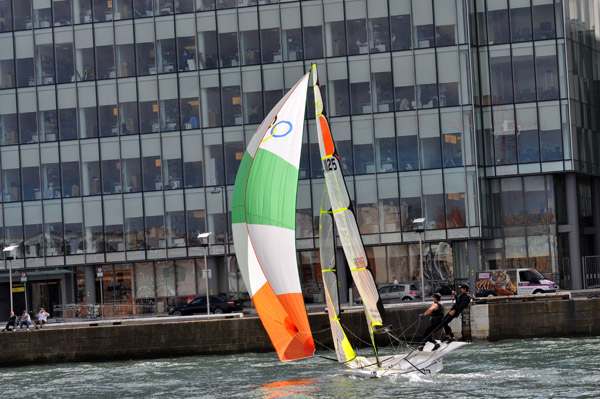
Action on the Liffey. Photo: Harry Hermon



























